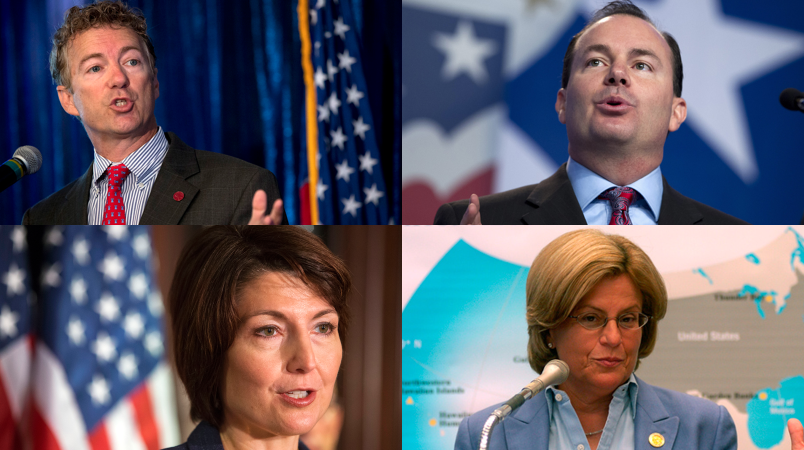There was no unified opposition at the conclusion of President Barack Obama’s State of the Union address Tuesday night. Instead, four different Republicans — representing, in some ways, four different factions of the Republican party — had something to say to the nation.
They shared some of the same talking points: Obamacare is a disaster and Obama’s economic agenda is ruining America’s future. The GOP is trying to offer some kind of alternative to the electorate. But the similarities largely stopped there, in yet another display of the fractured Republican Party that has a chronic inability to present a coherent and singular vision to the country.
Rep. Cathy McMorris Rodgers (WA) spoke for the party’s establishment, with the added bonus of being a woman in leadership at a time when the party’s standing with women seems shaky. Sen. Mike Lee (UT) was the self-appointed leader of the tea party, who rebutted the president while attempting to represent that nebulous constituency that has so influenced the party since 2010. Sen. Rand Paul (KY) more or less represented himself, the lone 2016 aspirant to speak Tuesday night, and also gave voice to the libertarian sect. And Rep. Ileana Ros-Lehtinen (FL) addressed the Spanish-speaking audiences on behalf of the party’s leadership, another attempt to reach a population with whom Republicans have been unpopular.
That just about covers everybody. Each constituency had a messenger, and ascendant members of the party had an opportunity to showcase themselves in the national spotlight.
The only problem is: It was hard to tell what exactly Republicans, as a whole, wanted Americans to take away from their multi-pronged rebuke of the president, other than their always-fervent opposition to Obama.
As the official voice of the party, McMorris Rogers continued the rebranding effort that has obsessed Republicans since the 2012 election. What exactly it was actually remained a bit opaque, but the tone was undeniably optimistic.
“Tonight I’d like to share a more hopeful, Republican vision — one that empowers you, not the government. It’s one that champions free markets — and trusts people to make their own decisions, not a government that decides for you,” she said. “It helps working families rise above the limits of poverty and protects our most vulnerable. And it’s one where Washington plays by the same rules that you do. It’s a vision that is fair and offers the promise of a better future for every American.”
Lee, by contrast, started by warning of the president’s economic agenda and attempted to turn Obama’s message of inequality against him.
“Today, Americans know in their hearts that something is wrong. Much of what is wrong relates to the sense that the ‘American Dream’ is falling out of reach for far too many of us,” Lee said. “We are facing an inequality crisis — one to which the President has paid lip-service, but seems uninterested in truly confronting or correcting.”
“But where does this new inequality come from? From government — every time it takes rights and opportunities away from the American people and gives them instead to politicians, bureaucrats and special interests.”
He then turned to a similar notion of positive reform that McMorris Rodgers, listing some of the work that conservatives have done in Congress — but made a explicit effort to distance himself from the party establishment line.
He referred to the “new generation of leaders in Washington” — people like Sen. Ted Cruz (TX) — who would aim to “Make D.C. Listen” as they had tried to do during last fall’s government shutdown. Those were the same people, you might remember, who drove House Republican leadership crazy during the shutdown debacle.
“This new generation of reformers still has a long way to go to win over our party in Washington, and even further to go to earn your trust,” Lee said.
Paul used his time almost entirely to deride the president for advancing the same kind of policies that he said have failed in the past. The familiar boogeymen of the national debt and government overreach in the private sector in the name of job creation reared their heads. He blamed the Federal Reserve for causing the financial crisis and recalled Solyndra as evidence of Obama’s missteps during his presidency.
“Government spending doesn’t work. It doesn’t create jobs,” Paul said. He blamed Democrats and Republicans for offering “more government” as their solution to the economic recession. He briefly forwarded his own idea of “economic freedom zones” where business and income taxes would be cut to a flat rate of 5 percent and regulations removed to create jobs. He also advocated for school choice through an education tax credit — specifics unavailable in the other responses from the GOP.
At the outset, Paul pledged to work with anybody toward his goals. “I will work with the President, Democrats, independents and anyone else who wants to get people back to work and alleviate poverty in our country.”
It seems the first step might be working with his fellow Republicans to figure out what exactly what they want to do.






